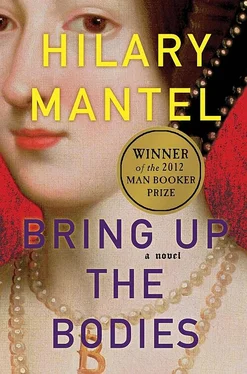‘You must understand,’ he says, ‘though Henry is at all points a man, he is a gentleman, and not a cur grunting in the gutter with…well, I say nothing of your own king’s choice of women. These last months,’ he takes a breath, ‘these last weeks particularly, have been a time of great trial and grief for my master. He now seeks happiness. Have no doubt that his new marriage will secure his realm and promote the welfare of England.’
He is talking as if he is writing; already he is casting his version into dispatches.
‘Oh, yes,’ the ambassador says, ‘the little person. One hears no great praise either of her beauty or her wit. He will not really marry her, another woman of no importance? When the Emperor offers him such lucrative matches…or so we hear. We understand everything, Cremuel. As a man and a woman, the king and the concubine may have their disputes, but there are more than the two of them in the world, this is not the Garden of Eden. When all’s said, it is the new politics she doesn’t suit. The old queen was, in some sort, the concubine’s protector, and ever since she died Henry has been plotting how he may become a respectable man again. So he must wed the first honest woman he sees, and in all truth it really does not matter whether she is the Emperor’s relative or no, because with the Boleyns gone, Cremuel is riding high, and he will be sure to pack the council with good imperialists.’ His lip curls; it might be a smile. ‘Cremuel, I wish you would say how much the Emperor Charles pays you. I have no doubt we could match it.’
He laughs. ‘Your master is seated on thorns. He knows my king has money flowing in. He is afraid that he might pay France a visit, and in arms.’
‘You know what you owe King Francis.’ The ambassador is annoyed. ‘Only our negotiations, most astute and subtle negotiations, prevent the Pope from striking your country from the list of Christian nations. We have, I think, been loyal friends to you, representing your cause better than you can yourselves.’
He nods. ‘I always enjoy hearing the French praise themselves. Will you dine with me later this week? Once this is over? And your queasiness has settled down?’
The ambassador inclines his head. His cap badge glitters and winks; it is a silver skull. ‘I shall report to my master that sadly I have tried and failed in the matter of Weston.’
‘Say you came too late. The tide was against you.’
‘No, I shall say Cremuel was against me. By the way, you know what Henry has done, don’t you?’ He seems amused. ‘He sent last week for a French executioner. Not from one of our own cities, but the man who chops heads in Calais. It seems there is no Englishman whom he trusts to behead his wife. I wonder he does not take her out himself and strangle her in the street.’
He turns to Kingston. The constable is an elderly man now, and though he was in France on the king’s business fifteen years ago he has not had much use for the language since; the cardinal’s advice was, speak English and shout loud. ‘Did you get that?’ he asks. ‘Henry has sent to Calais for the headsman.’
‘By the Mass,’ Kingston says. ‘Did he do it before the trial?’
‘So monsieur the ambassador tells me.’
‘I am glad of the news,’ Kingston says, loudly and slowly. ‘My mind. Much relieved.’ He taps his head. ‘I understand he employs a…’ He makes a swishing motion.
‘Yes, a sword,’ Dinteville says in English. ‘You may expect a graceful performance.’ He touches his hat, ‘ Au revoir , Master Secretary.’
They watch him go out. It is a performance in itself; his servants need to truss him in further wrappings. When he was here on his last mission, he spent the time sweltering under quilts, trying to sweat out a fever picked up from the influence of the English air, the moisture and the gnawing cold.
‘Little Jeannot,’ he says, looking after the ambassador. ‘He still fears the English summer. And the king – when he had his first audience with Henry, he could not stop shaking from terror. We had to hold him up, Norfolk and myself.’
‘Did I misunderstand,’ the constable says, ‘or did he say Weston was guilty of poems?’
‘Something like that.’ Anne, it appears, was a book left open on a desk for anyone to write on the pages, where only her husband should inscribe.
‘Anyway, there’s a matter off my mind,’ the constable says. ‘Did you ever see a woman burned? It is something I wish never to see, as I trust in God.’
When Cranmer comes to see him on the evening of 16 May, the archbishop looks ill, shadowed grooves running from nose to chin. Were they there a month ago? ‘I want all this to be over,’ he says, ‘and to get back to Kent.’
‘Did you leave Grete there?’ he says gently.
Cranmer nods. He seems hardly able to say his wife’s name. He is terrified every time the king mentions marriage, and of course these days the king mentions little else. ‘She is afraid that, with his next queen, the king will revert to Rome, and we shall be forced to part. I tell her, no, I know the king’s resolve. But whether he will change his thinking, so a priest can live openly with his wife…if I thought there was no hope of that, then I think I should have to let her go home, before there is nothing there for her. You know how it is, in a few years people die, they forget you, you forget your own language, or so I suppose.’
‘There is every hope,’ he says firmly. ‘And tell her, within a few months, in the new Parliament, I shall have wiped out all remnants of Rome from the statute books. And then, you know,’ he smiles, ‘once the assets are given out…well, once they have been directed to the pockets of Englishmen, they will not revert to the pockets of the Pope.’ He says, ‘How did you find the queen, did she make her confession to you?’
‘No. It is not yet the time. She will confess. At the last. If it comes to it.’
He is glad for Cranmer’s sake. What would be worse at this point? To hear a guilty woman admit everything, or to hear an innocent woman beg? And to be bound to silence, either way? Perhaps Anne will wait until there is no hope of a reprieve, preserving her secrets till then. He understands this. He would do the same.
‘I told her the arrangements made,’ Cranmer says, ‘for the annulment hearing. I told her it will be at Lambeth, it will be tomorrow. She said, will the king be there? I said no, madam, he sends his proctors. She said, he is busy with Seymour, and then she reproached herself, saying, I should not speak against Henry, should I? I said, it would be unwise. She said to me, may I come there to Lambeth, to speak for myself? I said no, there is no need, proctors have been appointed for you too. She seemed downcast. But then she said, tell me what the king wants me to sign. Whatever the king wants, I will agree. He may allow me to go to France, to a convent. Does he want me to say I was wed to Harry Percy? I said to her, madam, the earl denies it. And she laughed.’
He looks doubtful. Even the fullest disclosure, even a complete and detailed admission of guilt, it would not help her, not now, though it might have helped before the trial. The king doesn’t want to think about her lovers, past or present. He has wiped them out of his mind. And her too. She would not credit the extent to which Henry has erased her. He said yesterday, ‘I hope these arms of mine will soon receive Jane.’
Cranmer says, ‘She cannot imagine that the king has abandoned her. It is not yet a month since he made the Emperor’s ambassador bow to her.’
‘I think he did that for his own sake. Not for hers.’
‘I don’t know,’ Cranmer says. ‘I thought he loved her. I thought there was no estrangement between them, up until the last. I am forced to think I don’t know anything. Not about men. Not about women. Not about my faith, nor the faith of others. She said to me, “Shall I go to Heaven? Because I have done many good deeds in my time.”’
Читать дальше
Конец ознакомительного отрывка
Купить книгу












